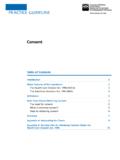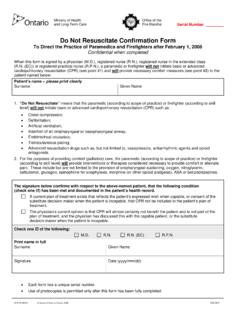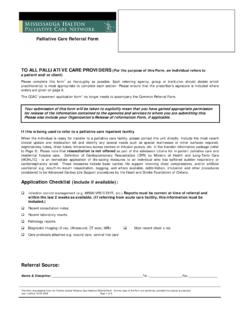Transcription of REPUBLIC OF SOUTH AFRICA IN THE LABOUR …
1 SAFLII Note: Certain personal/private details of parties or witnesses have been redacted from this document in compliance with the law and SAFLII Policy REPUBLIC OF SOUTH AFRICA IN THE LABOUR APPEAL COURT OF SOUTH AFRICA , CAPE TOWN Not Reportable Case no: CA19/2012 In the matter between: SOLID DOORS (PTY) LTD Appellant and COMMISSIONER JP HANEKOM First Respondent COMMISSION FOR CONCILIATION MEDIATION & ARBITRATION Second Respondent ANDR AFRICA Third Respondent Heard: 10 September 2013 Delivered: 30 May 2014 2 Summary: Review of arbitration award- employee dismissed for gross negligence- commissioner finding employee misconducted himself but dismissal substantively unfair- commissioner empowered to decide on the fairness of a dismissal- award meeting the reasonableness test- LABOUR Court judgment upheld- appeal dismissed. Coram: Waglay JP, Dlodlo AJA and Francis AJA JUDGMENT DLODLO AJA [1] The appellant in this matter unsuccessfully brought an application before the court a quo wherein it sought to have the arbitrator s award reviewed and set aside.
2 The arbitrator found that the sanction of dismissal imposed on the Third Respondent (Mr AFRICA ) had been substantively unfair and he ordered reinstatement (not retrospectively) coupled with a final written warning. [2] The appellant is a manufacturer of timber doors and mouldings. Mr AFRICA was employed as a dispatch manager at the appellant s Cape Town branch since October 2002. It was Mr AFRICA s duty to ensure that all deliveries are dealt with in accordance with the appellant s procedures. The appellant s financial department situated at its head office in Johannesburg approves sales orders by granting credit facilities to customers. Once the credit has been approved, employees located at any branch where the goods are purchased would deliver the goods to the delivery address. [3] In the case that led to the dismissal of Mr AFRICA , a company called Security and Fire Projects (Pty) Limited ( SFP ) had applied for credit and was granted such credit by the appellant s financial manager on a number of occasions.
3 Goods so purchased 3 had been collected either at the appellant s branch or delivered to SFP. However, it appears that although SFP was an existing company, a fictitious (bogus) company had applied for credit using SFP s credential. The financial manager approved the credit to this bogus company for sales orders to the value of R135 000. The bogus customer had provided a delivery address of [..]. It was then the duty of Mr AFRICA to dispatch the purchased goods to the delivery address stated on the invoice. [4] On 11 November 2009, a truck driver ( Mr Kume ) was despatched to deliver timber products purchased on credit by SFP. The delivery address provided on the invoice was 121 Stock Road Philippi. Mr Kume could not find this address and he consequently telephoned Mr AFRICA . The latter apparently in turn telephoned the customer. The customer undertook to send a representative who would show Mr Kume where the goods were to be delivered.
4 [5] According to the evidence, the customer thereafter telephoned Mr Kume directly advising him to offload the goods under trees next to the Philippi train Station in the same Stock Road. That is what Mr Kume did. Subsequently to the delivery, there were other credit purchases made by the same customer but these were loaded by the latter in its own transport. As mentioned above, the credit department of the appellant in Johannesburg had approved a bogus credit application by SFP. It was pursuant to the approval of this credit application that SFP had ordered timber products from the appellant which Mr Kume was to deliver to [..]. [6] After the appellant discovered that SFP was a bogus company it charged, Mr AFRICA and dismissed him for gross negligence on the basis that he instructed Mr Kume to deliver the goods to a bogus customer at a place other than the business address stated in the customer s credit application form.
5 The aggregate loss suffered both as a result of the delivery of timber products to an unauthorized address as well as the subsequent collections of timber products referred to above amounted to R135 000. [7] Following his dismissal, Mr AFRICA referred an unfair dismissal to the CCMA. The arbitrator found that the sanction of dismissal had been substantively unfair. On 4 review, the court a quo held that the appellant failed to show that the arbitrator s award was one that a reasonable decision -maker could not have made and it proceeded to dismiss the review application and ordered that each party was to pay its own costs. [8] It is trite law that the test that must be applied in determining whether an arbitration award should pass musters of judicial review under section 145 of the LABOUR Relations Act 66 of 1995 ( the LRA ) is that of the constitutional standard of reasonableness. The question that needs to be asked and answered is the following: Is the decision made by the arbitrator one which a reasonable decision -maker could not reach?
6 1 It was submitted on behalf of the appellant that Mr AFRICA s involvement in the events that led to the delivery of the timber products to an unauthorized delivery address constituted gross negligence and not the kind of negligence found by the Commissioner. It is further contended on behalf of the appellant that Mr AFRICA abdicated his responsibility by allowing SFP to telephone Mr Kume and arrange an alternative delivery address with him instead of himself ascertaining the delivery address. [9] It is debatable if the conduct of Mr AFRICA is such that it qualified to be stigmatized as gross negligence. I say that despite my acceptance that the appellant s policy provides that a driver who finds himself in circumstances that he cannot find the delivery address should return with the load to the depot. The policy of the appellant explained above should ordinarily be known to the driver as well.
7 There was no necessity for Mr Kume to telephone Mr AFRICA . Upon failure to find the delivery address, he simply should have driven back to the depot with the load in keeping with the provision of his employer s policy and would have reported to Mr AFRICA what the position was on arrival at the depot. 1 Sidumo and Another v Rustenburg Platinum Mines Ltd and Others (2007) 281 ILJ 2405 (CC) at para 110. 5 [10] The contention advanced on behalf of the appellant that it is unlikely that the fraudulent transactions would have taken place had Mr AFRICA questioned SFP about its place of business because he would have then ascertained that in fact it did not have a place of business and that in turn would have alerted him that SFP may be a bogus or fictitious business, needs to be dealt with. In the first place, this is speculation at its best. Nobody knows for a fact what SFP s reaction would have been upon being so questioned.
8 Perhaps it would have told Mr AFRICA another lie. It could simply have used another entity s business address in the same way as it had used another company s credentials and succeeded in effectively deceiving the appellant s finance department which approved its credit application. I accept that Mr AFRICA should have acted differently. But the contention being advanced seemingly leaves out of the equation that it was the appellant s finance department that approved the credit application of this bogus purchaser. The finance department failed to determine and question the legitimacy of SFP. Most certainly, Mr AFRICA would have failed to gather that it was a bogus entity on questioning it about its place of business. [11] It must be borne in mind that when SFP purchased timber products from the appellant s Cape Town branch seeing that it had been granted credit, Mr AFRICA was entitled to accept that it had been scrutinized and that is why its credit worthiness had been approved.
9 It is wrong to simply brush this aspect aside and contend that had Mr AFRICA questioned the delivery address, fraud would probably have been averted. It is contended on behalf of the appellant that the Commissioner did not apply his mind to the fact that Mr AFRICA abdicated his responsibility by not instructing Mr Kume to return with the goods and instead allowed SFP to communicate the alternative address to Mr Kume. I have dealt with this aspect. The truth of the matter is that the Commissioner dealt with this aspect and he found Mr AFRICA to have been negligent. The Commissioner expressly found that Mr AFRICA should not have left it all to the customer and the driver to secure delivery at an alternative address and that as a person in charge of the dispatch warehouse more was expected of Mr AFRICA in ensuring that goods did not fall into the wrong hands. 6 To end this aspect one perhaps needs to resort to setting out what was held by this Court in Fidelity Cash Management Service v CCMA and Others 2 namely: It will often happen that, in assessing the reasonableness or otherwise of an arbitration award or other decision of a CCMA commissioner, the court feels that it would have arrived at a different decision or finding to that reached by the commissioner.
10 When that happens, the court will need to remind itself that the task of determining the fairness or otherwise of such a dismissal is in terms of the Act primarily given to the commissioner and that the system would never work if the court would interfere with every decision or arbitration award of the CCMA simply because it, that is the court, would have dealt with the matter [12] The test is and remains that enunciated by the Constitutional court in Sidumo and Another v Rustenburg Platinum Mines Ltd and Others (2007) 281 ILJ 2405 (CC); [2007] 12 BLLR 1097 (CC). The onus of showing that the reasonable decision -maker could not have decided as the Commissioner did, rests upon the appellant. If courts were to substitute the decisions made by commissioners even if it is apparent that such commissioners considered all deserving factors placed before them prior to reaching such decisions then the whole system of dispute resolution on the shoulders of the CCMA may be doomed to failure.















